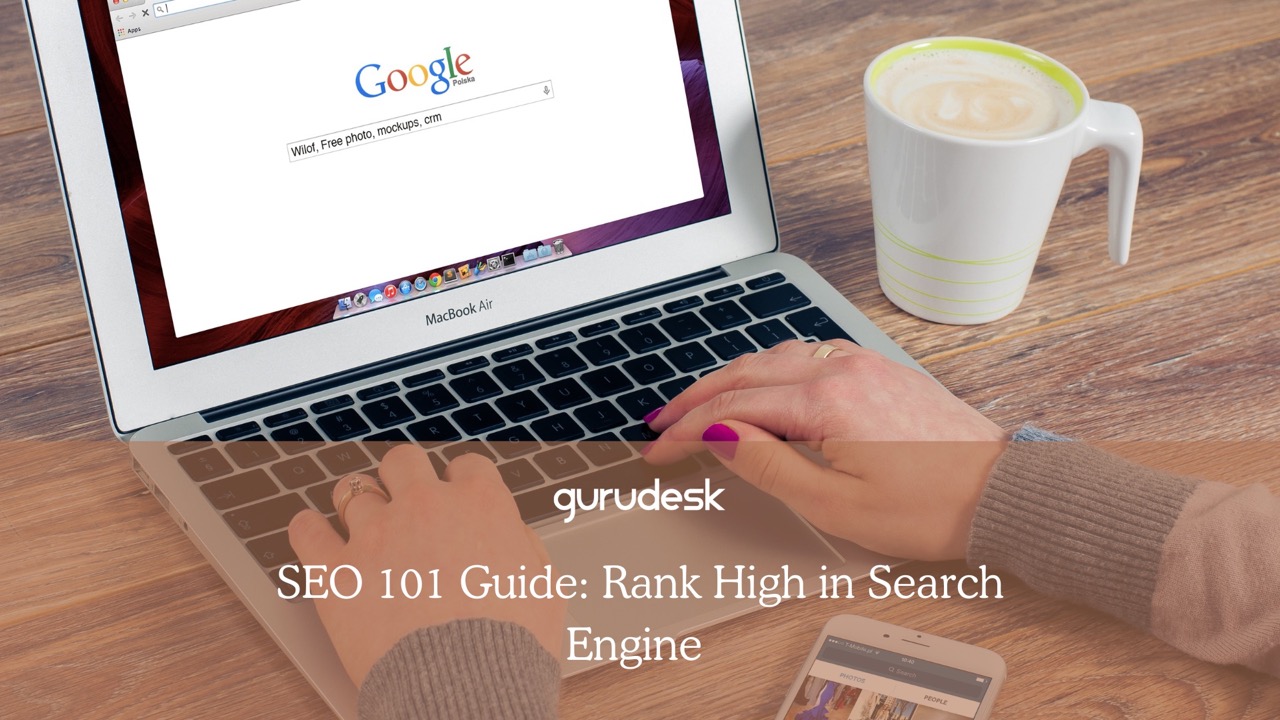
User experience affect search engine rankings
SEO or Search engine optimization is the process of improving the visibility of your website or web pages. It’s to assist users in finding what they are looking for using the relevant keywords and phrases.
User experience affects search engine rankings. Playing a critical role in a website’s SEO, UX influences it in several key ways.
Search engines track how users interact with your website. Engagement and bounce rate directly impact rankings.
With a longer engagement rate and good UX, this lowers bounce rates, signaling relevance and satisfaction to search engines.

Here’s how user experience impacts search engine rankings:
The Evolution of Search Engines
Modern search engines have left keyword stuffing behind and moved on to a new frontier: the User Experience.
This shift wasn’t just a philosophical one; it was driven by an algorithmic revolution. Search engines like Google started to evolve, crafting intelligent algorithms that went beyond keyword analysis.
They began measuring user engagement, looking at metrics like dwell time (how long users stay on a page), bounce rate (how often they leave after one page), and click-through rate (how often they click on your search result).
These metrics paint a clearer picture of the actual user experience: is your website informative? Engaging? Easy to navigate?
Suddenly, keywords alone weren’t enough. Websites that provided a positive user experience, with well-structured and valuable content, fast loading times, and intuitive navigation, started rising in the rankings.
A focus on genuine value and user satisfaction has replaced keyword stuffing and spammy tactics as relics of the past.
This evolution paved the way for the rise of UX SEO, a new approach that prioritizes user experience as the foundation for good search engine optimization.
It’s no longer just about keywords and backlinks; it’s about creating a website that users actually enjoy spending time on. And that’s where the real magic happens.
With good UX SEO, you can attract qualified traffic, increase engagement, and build brand loyalty. Users stay longer, explore more, and convert at higher rates.
And search engines recognize these positive signals, rewarding you with higher rankings and more organic visibility.
Key User Metrics Affecting Rankings
For search engines, dwell time is like a gold star for relevance. When users linger on your website, it sends a powerful signal: “This content is valuable! It answers my query! I want more!”
Search engines interpret this extended engagement as a positive user experience, indicating your website offers relevant information and keeps visitors hooked.
The longer the dwell time, the higher your standing in their eyes, and ultimately, the higher your ranking in search results.
Bounce Rate
The bounce rate is the percentage of visitors who leave your website within 30 seconds. Though some customers may find what they’re looking for on only one page, the longer they stay to read the content or to make a purchase, the lower your bounce rate.
High bounce rates scream irrelevance to search engines. They say, “This website didn’t offer what I was looking for! I fled in terror!”
This negative user experience signals that your website isn’t meeting user needs, leading to lower rankings as a consequence.
Think of it as a red flag for search engines, prompting them to push your website down the results page.
Clicks, Conversions, and Shares
Clicks, conversions, and shares all play vital roles in the user experience symphony:
- Clicks: Each click on your website, whether on internal links or calls to action, signifies user interest and exploration. Increased clicks tell search engines that your content is stimulating and guiding users further within your website.
- Conversions: Whether it’s a purchase, a signup, or a download, conversions represent the culmination of a successful user journey. They demonstrate that your website effectively delivers on its promises, leading search engines to favor it as a relevant and valuable resource.
- Shares: When users love your content enough to share it with others, it’s a social media love letter to your website. Shares spread the word organically, increasing traffic and brand awareness, which search engines recognize as strong positive signals.
By keeping these metrics in harmony, you create a website that users love to linger on, click through, and ultimately convert. And when the audience sings your praises to search engines, your website’s ranking can reach a whole new level.
User Experience Design Factors for SEO Success
To conquer the search engine landscape, you need to wield the mighty sword of UX design. Forget keyword stuffing and link-building dark magic; user experience is the new currency of SEO, and these six factors are your golden coins:
1. Page Speed
Imagine navigating your kingdom on a sloth—frustrating, right? That’s how users feel with slow websites.
Every second of loading time is a lost audience member, a higher bounce rate, and a whispered curse against your rankings.
Search engines see these woes too, pushing slowpokes down the SERP ladder.
Optimize your images, minify code, and leverage caching. Using the right format for your images actually helps your website load faster, further reducing bounceback rates!
Not to mention the importance of web hosting for SEO. Their servers play a vital role. If they have weak servers, chances are your website’s page speed will be negatively impacted.

2. Mobile Friendliness
More than 50% of web traffic comes from mobile devices.
This means that neglecting mobile optimization is like missing out on a huge potential audience for your website.
A user-friendly mobile experience keeps visitors happy and engaged, increasing the chance of conversions and positive interactions.
Embrace mobile responsiveness, craft layouts that are intriguing, and watch your mobile traffic (and rankings) flourish.
Remember, happy mobile users are loyal customers!
3. URL Structure
Imagine venturing into your kingdom with a map written in riddles. That’s what confusing URLs feel like. Users (and search engines) need intuitive, keyword-rich URLs that explain the page’s contents.
Think “knights-training-ground” instead of “page-12345.” Clear URLs guide users and search bots where they need to go, boosting engagement and SEO alike.
4. URL Hierarchy
Think of your website structure as a network of paths.
Too many subfolders (think five or more) become dense jungles, disorienting users and search engines. Aim for a shallow hierarchy, preferably under four subfolders.
This keeps your kingdom organized, navigation a breeze, and your ranking potential high. Remember, a tidy kingdom is a well-ranked kingdom!
5. Navigation
A confusing, cluttered menu is like a broken compass in the wilderness. Users (and search engines) get lost, frustrated, and wander off.
Craft clear, concise menus with easily identifiable categories and limited items (ideally seven or less).
Streamline your layout, utilize drop-down menus cleverly, and consider search bars only if your kingdom grows vast.
A user-friendly navigation means happy explorers (and higher rankings)!

6. Search Bar
A well-placed search bar can be a helpful beacon, especially for sprawling websites. But beware of menu overload!
If your navigation is clear and concise, a search bar might be redundant. Weigh the pros and cons based on your kingdom’s size and complexity.
Remember, a clean interface is key, and less is often more when it comes to the user experience.
The Benefits of Good UX SEO
1. User Engagement
Imagine a vibrant marketplace bustling with satisfied customers.
That’s what a website with good UX feels like. Clear navigation, fast loading times, and engaging content keep users clicking, exploring, and coming back for more.
This translates into magic metrics like longer dwell times and lower bounce rates – signals to search engines that your website is user paradise.
Happy clicks lead to higher rankings, solidifying your digital dominion.
2. Ranking: SERP
Forget chasing keywords like mythical beasts.
Good UX SEO weaves a spell of user satisfaction that captivates search engines. With metrics singing your praises, algorithms elevate your website in the coveted Search Engine Results Pages (SERPs).
It’s like climbing Mount Olympus, one happy click at a time. Higher visibility means more organic traffic, more leads, and ultimately more success in your digital kingdom.
3. Building Trust
Good UX isn’t just about clicks; it’s about building trust. A well-designed website whispers professionalism, reliability, and care.
Users feel comfortable, informed, and valued, forming a bond with your brand. This translates into loyalty, repeat visits, and positive word-of-mouth—the holy trinity of brand ascension.
As your reputation soars, you become a beacon of quality, attracting even more users and solidifying your digital power.
Remember, good UX SEO isn’t just a tactic; it’s a philosophy. By prioritizing the user experience at every turn, you create a website that not only ranks highly but also attracts loyal followers.
It’s a win-win scenario—a thriving digital kingdom where users are happy citizens and your brand reigns supreme.
So, equip yourself with the UX SEO trident, embrace user engagement, conquer search engines, and ascend to the digital throne!

How User Experience Affects Search Engine Rankings
The evolution of search engines demands not just SEO but also UX.
Exploring how user experience impacts your search engine’s standing, therefore, impacts the rise of metrics such as dwell time and bounce rate, revealing their power to signal relevance and satisfaction.
We’ve witnessed the fall of keyword stuffing and spam tactics, replaced by the gentle touch of good UX design.
Your website is not just a collection of pages; it’s a digital domain to be created with care.
Optimize for speed, embrace mobile-friendliness, craft clear navigation, and consider every element through the lens of user satisfaction. These are the golden rules that buy you higher rankings, increased engagement, and ultimately, brand loyalty.
As you prioritize user satisfaction, you won’t just climb the SERP ladder; you’ll build a digital kingdom that stands the test of time, attracts loyal subjects, and endures success.
Join the GuruDesk community and be among the first ones to discover the hottest trends in web services! We are a team of web experts and we love sharing our knowledge and experience with our readers! We share tips and tricks on a wide range of topics, including web development, cloud services, and hosting. Whether you are a seasoned pro or just starting out, we promise you will find valuable information here. So go ahead, hit that “Subscribe” button and let the fun begin!






